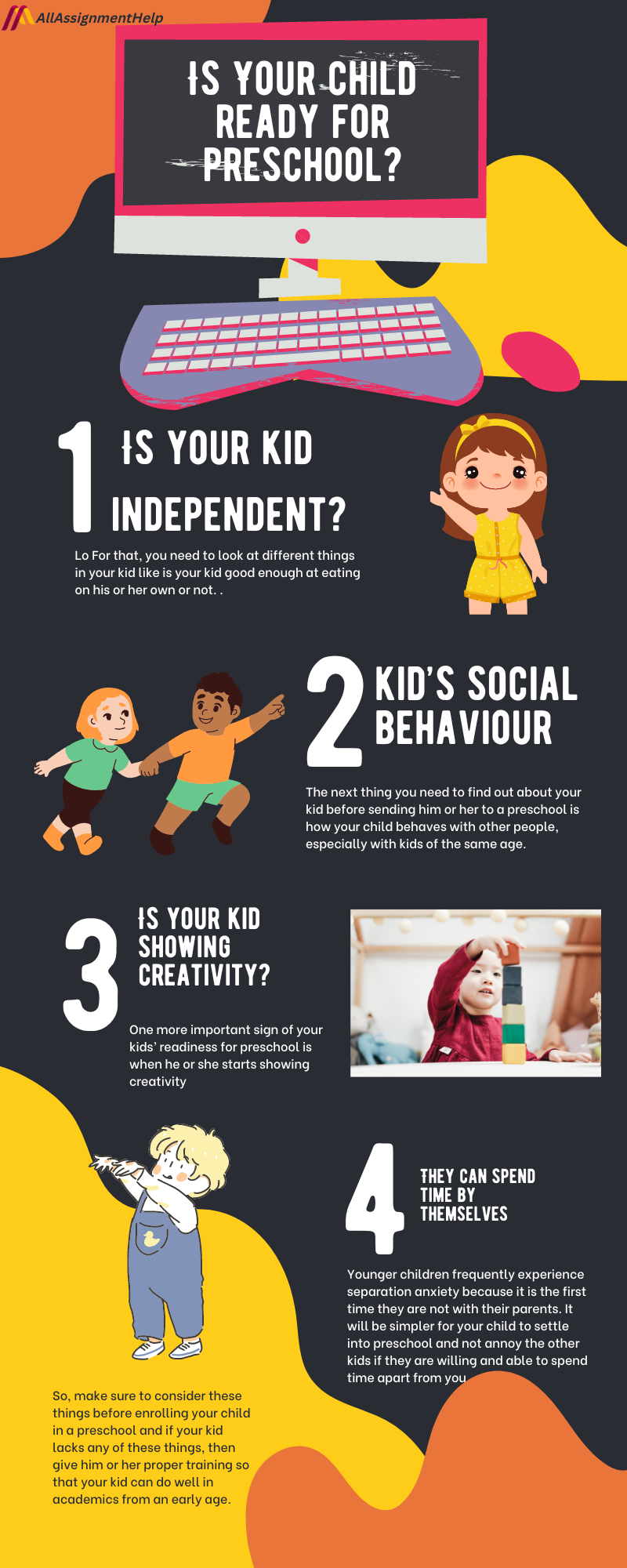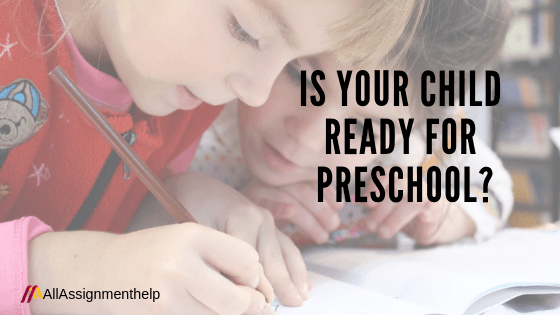Table of Contents
A growing body of research indicates that a good preschool helps children develop their intellectual and social skills and gives them an advantage for kindergarten and beyond. That requires searching for a reputable programme and considering the possibility that their child may not be prepared for preschool for parents of 3- and 4-year-olds.
Every parent feels joyful seeing their child taking the first step, uttering the first words, and showing various emotions as he or she grows up slowly. With all that, there arises the need of sending your kid to a preschool. However, many institutes give admission to toddlers who have crossed the age of 2. But with age, there are many things your kid needs to have to fit in a preschool. Want to know those things? Read on.
Know About Your Child-Is He Ready For Preschool?
Preschool is mostly used for socialising, to show children that learning can be enjoyable, and to educate them on how to cooperate, share, and get along with others. However, parents shouldn’t decide to enrol their children in preschool in the hopes that it will help them advance. First, you should know that your child is ready for preschool. How? Read the below suggestions:
Is your kid independent?
If you are thinking of sending your kid to a preschool, you first need to find out whether your kid is independent or not. For that, you need to look at different things in your kid like is your kid good enough at eating on his or her own or not. Can the kid tell the adults if he or she needs to go to the washroom or has some other problem? If you find these things in your kid, then you can send your kid to a preschool.
However, you can take our expert’s advice if you are not able to figure it out by yourself. Yes, we are a huge group of experts, they can help you with everything. You can search for assignment helper USA and find our expert at the top list.
What’s your kid’s social behaviour?
The next thing you need to find out about your kid before sending him or her to a preschool is how your child behaves with other people, especially with kids of the same age. You find out this thing by seeing if your kid interacts well with other kids, does your child share his or her toys with others? And you need to make sure that your child doesn’t lose their cool too early and doesn’t get in a fight with other children. If you can answer these questions in the affirmative, then you can go ahead and get the kid enrolled in a preschool.
Read Also: Classroom Management: A Necessity To Improve Students Behavior
Is your kid showing creativity?
One more important sign of your kids’ readiness for preschool is when he or she starts showing creativity. For example, if you find your kid picking up your lipstick or some colours and drawing something on the walls or paper, then it’s time for you to start looking for a preschool so that your kid can polish his or her skills at an early age and can achieve his or her aims in the future.

They can spend time by themselves
Younger children frequently experience separation anxiety because it is the first time they are not with their parents. It will be simpler for your child to settle into preschool and not annoy the other kids if they are willing and able to spend time apart from you. If you are unsure, you can find out if they will be unhappy spending a long day apart from you by letting them stay with a babysitter or relative for the day. In either case, this is a key sign of your child’s readiness.
Also, before enrolling your child in preschool you can take two-three online sessions so that you will get to know that your child is ready to cope with the teacher. However, we offer online class help, if you do not understand the pattern of online classes, we may help you.
Do they have a greater capacity for sustained concentration?
Your child has to be able to focus on one task for a longer amount of time before entering preschool. Preschool activities typically last fifteen to twenty minutes. Make sure your youngster can focus for that long without getting distracted in order to avoid any problems.
Read Also: Good And Bad Impacts Of Technology On Children And Their Education
Is Your Child Capable of Handling Change?
Before preschool begins, you should focus on transitioning if your kid struggles to do so, especially when they are deeply engaged in an activity they enjoy. One critical skill toddlers must develop is the ability to transition as a class from one activity to the next.
Use a basic wall chart to indicate the sequence of events, such as meals, playtime, outdoor time, storytime, and snacks. These charts serve as prompts for them to move on to the subsequent task as well as reminders of what is coming up next in their day.
Are they able to finish a school day with plenty of energy?
Many children find that school days are a little bit longer than what they are accustomed to. Given this, you must make sure your child has the energy to finish the day or at the very least make it to a scheduled nap time. Children who lose their patients frequently become irritable or furious, which might result in calls to the parents. Whether or not your child can withstand a full preschool day is another key sign of whether or not they are prepared for preschool.
So, make sure to consider these things before enrolling your child in a preschool and if your kid lacks any of these things, then give him or her proper training so that your kid can do well in academics from an early age. That said, this writing piece ends here. Hope it was helpful.
Is preschool a must?
Your child’s social and academic development can be greatly aided by preschool. Recent studies suggest that your child’s preschool experience may have a significant impact on their future academic success and that play-based preschools may be the most advantageous. Therefore, even though you have the option to let your child skip preschool, it’s a good idea to find other opportunities for them to engage in play-based activities with other children.
Read: How can parents assist their children with their homework?
How to get your kid ready for preschool?
Here are some suggestions for assisting your child with preschool readiness:
- Early on in the process of potty training. Instead of hurrying to finish a project for school, they can study at their own pace this way.
- Try to plan some time apart for your child if they haven’t had much time away from you—perhaps a night with grandma or an afternoon with a nanny.
- Start introducing your youngster to group activities if they aren’t used to them. For example, sign them up for a class like tumbling or accompany them to story time at your neighbourhood library to help them become used to playing with other kids.
- Standardizing your child’s days before preschool can be beneficial if they don’t adhere to a schedule. Maintain a nighttime ritual and serve meals at regular intervals (such as bath, then books, then bed).
- Establish playtimes during which your youngster can amuse themselves for five to fifteen minutes. Encourage your youngster to create animals out of clay, for instance, while you are washing the dishes. Build up to extended solo play periods gradually.
- Your child’s nap time should be coordinated with the preschool’s timetable. If naptime at preschool is after lunch but your child still needs a mid-morning nap, progressively advancing nap time each day will help them adjust.
We are an assignment help online provider that provides top-quality assignment writing solutions to students. We have clients from US, Australia and many other parts of the world who go for our online assignment help to get their management, law, nursing, programming and many other assignments done by our highly qualified assignment writing experts. So, if your kid is having a problem writing an assignment, then you can try our assignment help and can get a fantastic assignment solution from us.
FAQs
| Que.1. What age is appropriate for preschool? Ans. The ideal preschool age varies from kid to child and is influenced by a number of variables, including age. The majority of preschoolers, however, range in age from 3 to 5. |
| Ques.2. Preschool readiness: What is it? Ans. When a child is developmentally ready for preschool, we say they are in preschool readiness. Age, social-emotional development, the capacity to manage basic self-care chores, and other academic and physical skills are all variables that may affect preschool preparedness. |
